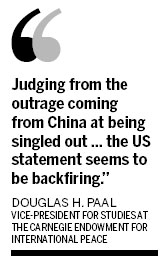Are US words worsening South China Sea issue?
Updated: 2012-08-15 08:07
By Zhao Shengnan (China Daily)
|
|||||||||||

Observers question whether Washington is fueling tensions
The United States' latest statements about the South China Sea have prompted more US observers to question whether Washington's biased stance toward countries in the region will make relations there tenser and further complicate matters.
On Aug 3, the US State Department released a statement citing China's decision to upgrade the administrative level of Sansha city to the prefecture level and establish a new military garrison there as evidence that China is trying to militarize the South China Sea. China immediately responded by summoning Robert Wang, US charge d'affaires, to Beijing in protest of the accusation.
"Judging from the outrage coming from China at being singled out, after Vietnam and the Philippines had taken steps, without being criticized, to secure resources in the contested sea before China's own actions, the US statement seems to be backfiring," Douglas H. Paal, vice-president for studies at the Carnegie Endowment for International Peace, a US think tank, said in an article on Saturday.
China, Vietnam, the Philippines, Brunei and Malaysia have claims to sovereignty over various overlapping parts of the South China Sea, which contains valuable energy reserves and important sea lanes.
Paal warned Washington that its biased approach will undermine both its principles that are based on international laws and its strategic objectives in Asia, one of which is to manage China's rise "in ways that do not diminish vital American interests in the region".
China and the US usually cooperate as trade partners, but "US criticism of Beijing's latest move in the South China Sea hits too close to some of China's vital interests", said The Christian Science Monitor.
On Monday, US military newspaper Stars and Stripes newspaper, which reports on matters pertaining to the US armed forces, said some analysts maintain that China hasn't intentionally assumed a more aggressive policy in the South China Sea, but is rather trying to maintain the status quo in the face of its neighbors' sovereignty claims.
"Those viewing Chinese 'aggression' as the impetus for current tension might reasonably be asked why Beijing has only six outposts in the Nansha Islands, why Beijing is one of the only claimant states not currently pumping oil out of the South China Sea," Lyle Goldstein, an associate professor at the US Naval War College wrote in Foreign Policy magazine in July.
"China has not militarized its foreign policy and does not appear equipped to do so for a long time", while Manila and Hanoi "eagerly encourage American weight thrown onto their side of the competition with China for free", Pall said.
"This is where the US needs to move with caution and only after thinking many steps ahead", given that "China and those neighbors have more going constructively in trade, investment and other relations with each other than is at risk in this dispute", he added.
Washington's support of its allies in Southeast Asia has given rise to unnecessary tension in the region, but the region's strong desire for peace and development will certainly defeat any countries' provocations, said Zhang Jiuhuan, former Chinese ambassador to Thailand and Singapore.
Paul Keating, former prime minister of Australia, another US ally in the Asia-Pacific, said he has long held the view that the future of Asian stability cannot be cast by a non-Asian power - especially by the application of US military force.
"And with our trade preponderantly in North Asia and the greater part of that with China, there is every reason to support the development of a cooperative structure between the US and China in the Pacific," he said on Aug 6.
zhaoshengnan@chinadaily.com.cn
(China Daily 08/15/2012 page11)
Today's Top News
President Xi confident in recovery from quake
H7N9 update: 104 cases, 21 deaths
Telecom workers restore links
Coal mine blast kills 18 in Jilin
Intl scholarship puts China on the map
More bird flu patients discharged
Gold loses sheen, but still a safe bet
US 'turns blind eye to human rights'
Hot Topics
Lunar probe , China growth forecasts, Emission rules get tougher, China seen through 'colored lens', International board,
Editor's Picks

|

|

|

|

|

|





